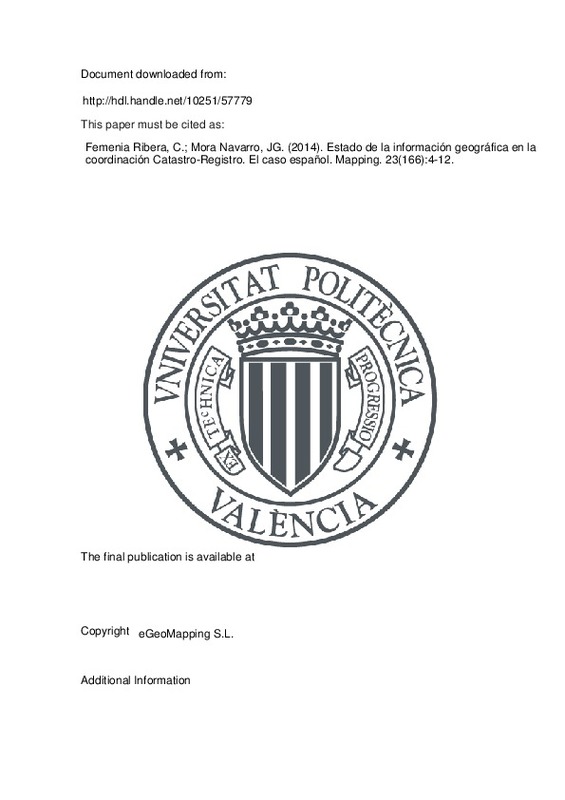JavaScript is disabled for your browser. Some features of this site may not work without it.
Buscar en RiuNet
Listar
Mi cuenta
Estadísticas
Ayuda RiuNet
Admin. UPV
Estado de la información geográfica en la coordinación Catastro-Registro. El caso español
Mostrar el registro sencillo del ítem
Ficheros en el ítem
| dc.contributor.author | Femenía Ribera, Carmen
|
es_ES |
| dc.contributor.author | Mora Navarro, Joaquin Gaspar
|
es_ES |
| dc.date.accessioned | 2015-11-19T16:33:33Z | |
| dc.date.available | 2015-11-19T16:33:33Z | |
| dc.date.issued | 2014-07 | |
| dc.identifier.issn | 1131-9100 | |
| dc.identifier.uri | http://hdl.handle.net/10251/57779 | |
| dc.description.abstract | [ES] En un buen sistema de administración del territorio es necesaria una perfecta coordinación entre el Catastro y el Registro de la Propiedad; apoyando dicha gestión del territorio sobre una buena base gráfica. Los países con un Catastro jurídico disponen desde sus comienzos de una cartografía precisa como base de su modelo, mientras que los países con un Catastro de modelo fiscal como el español, tienen una base gráfica que no puede ser utilizada de modo definitivo con fines jurídicos; mientras, la seguridad jurídica, la da el Registro de la Propiedad. Este artículo pretende ser una recopilación de la situación a nivel internacional, y en concreto para el caso español, de los proyectos y normas relacionados con la información gráfica y la cartografía en la coordinación Catastro-Registro. Desde los organismos que tratan a nivel internacional este tema, como es el caso de la FIG o los comités permanentes del Catastro, tanto Europeo como Iberoamericano, pasando por las normas y acuerdos internacionales como el Catastro 2014, la norma Land Administration Domain Model: ISO 19152, hasta el reciente Catastro 2034. Destacando en el caso español los distintos proyectos llevados a cabo por la Dirección General de Catastro (DGC), con el SIGCA3; el Colegio de Registradores (CORPME), con el Geobase o el Consejo General del Notariado (CGN) con el Proyecto Ramón Llull. Llegando actualmente a la reforma de la Ley Hipotecaria y del Texto Refundido de la Ley del Catastro Inmobiliario en materia de coordinación de ambos organismos y que en estos momentos está sobre la mesa pendiente de aprobación parlamentaria. | es_ES |
| dc.description.abstract | [EN] In a good system of territory administration a perfect coordination between the land registry and the record of the property is necessary; supporting the above mentioned management of the territory on a good graphical base. The countries with a juridical land registry have a precise cartography available from his beginning as the basis of his model, whereas the countries with a fiscal land registry model, like the Spanish, have a graphical base that cannot be u sed for juridical ends in a definitive way; while, the juridical safety, is given for the Record of the Property. This artic/e tries to be a summary of the international situation. and in particular for the Spanish case, of projects and standards related to the graphical information and the cartography in the coordination Cadastre-Public Register. Since the organisms that treat internationally this tapie, as in is the case of the FIG (lnternational Federation of Surveyors) or the permanent committees of the Land registry, both European and Latin American, happening for the international standards and agreements such as the Cadastre 2074, the Land Administration Domain Model: ISO 19152 standard, unti/ to the recent Cadastre 2034. In the Spanish case we can emphasize the different projects carried out by the General Directorate for Cadastre (DGC), with the SIGCA3; the College of Registrars (CORPME), with the Geobase or the General Council of Notaries (CGN) with the Ramon L/ul/ Project. Reaching currently to the reform of the Mortgage Law and the Revised Text of the Real-estate cadastre Law on coordination of both organisms and, that in these moments, is on the table pending on parliamentary approval. | |
| dc.description.sponsorship | Este estudio ha sido desarrollado en el proyecto de investigación «El Registro de la Propiedad como instrumento vertebrador de la información territorial; datos espaciales, metadatos y Directiva Inspire (11)», DER2011-23321 financiado por el Ministerio de Economía y Competitividad del Estado Español. | |
| dc.language | Español | es_ES |
| dc.publisher | eGeoMapping S.L. | es_ES |
| dc.relation.ispartof | Mapping | es_ES |
| dc.rights | Reserva de todos los derechos | es_ES |
| dc.subject | Catastro | es_ES |
| dc.subject | Registro de la Propiedad | es_ES |
| dc.subject | Cartografía | es_ES |
| dc.subject | Delimitación de la propiedad | es_ES |
| dc.subject | Agrimensor-Geómetra | es_ES |
| dc.subject | Catastro 2014 | es_ES |
| dc.subject | LADM | es_ES |
| dc.subject.classification | INGENIERIA CARTOGRAFICA, GEODESIA Y FOTOGRAMETRIA | es_ES |
| dc.title | Estado de la información geográfica en la coordinación Catastro-Registro. El caso español | es_ES |
| dc.title.alternative | State of the geographical information in the land registry- registry of property coordination. The Spanish case | |
| dc.type | Artículo | es_ES |
| dc.relation.projectID | info:eu-repo/grantAgreement/MICINN//DER2011-23321/ES/EL REGISTRO DE LA PROPIEDAD COMO INSTRUMENTO VERTEBRADOR DE LA INFORMACION TERRITORIAL: DATOS ESPACIALES, METADATOS Y DIRECTIVA INSPIRE (II)/ | es_ES |
| dc.rights.accessRights | Abierto | es_ES |
| dc.contributor.affiliation | Universitat Politècnica de València. Departamento de Ingeniería Cartográfica Geodesia y Fotogrametría - Departament d'Enginyeria Cartogràfica, Geodèsia i Fotogrametria | es_ES |
| dc.description.bibliographicCitation | Femenía Ribera, C.; Mora Navarro, JG. (2014). Estado de la información geográfica en la coordinación Catastro-Registro. El caso español. Mapping. 23(166):4-12. http://hdl.handle.net/10251/57779 | es_ES |
| dc.description.accrualMethod | S | es_ES |
| dc.relation.publisherversion | http://revistamapping.com/ | |
| dc.description.upvformatpinicio | 4 | es_ES |
| dc.description.upvformatpfin | 12 | es_ES |
| dc.type.version | info:eu-repo/semantics/publishedVersion | es_ES |
| dc.description.volume | 23 | es_ES |
| dc.description.issue | 166 | es_ES |
| dc.relation.senia | 269050 | es_ES |
| dc.contributor.funder | Ministerio de Ciencia e Innovación | es_ES |





![[Cerrado]](/themes/UPV/images/candado.png)

